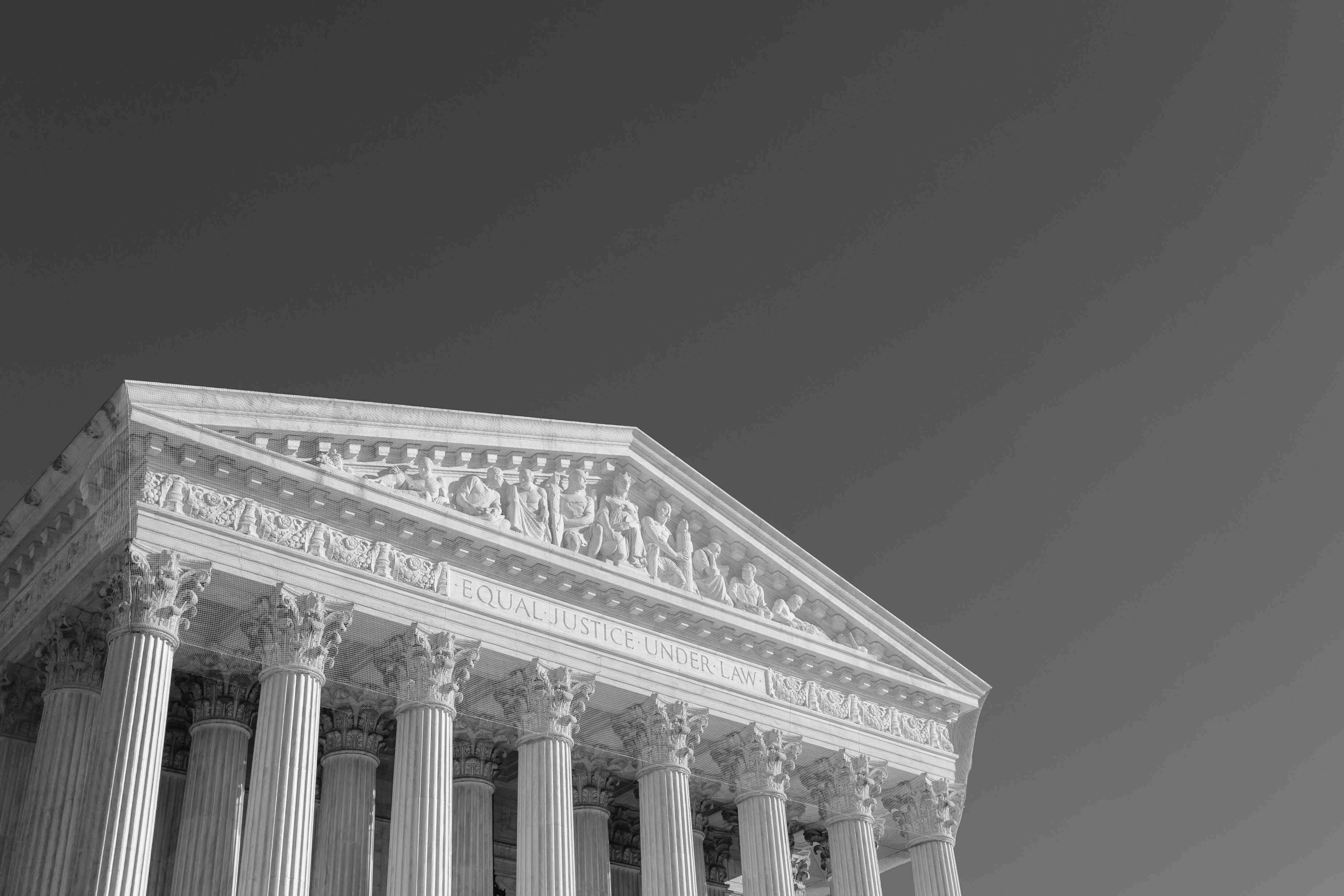






Tuesday, October 8
6:30-8:30pm












Tuesday, October 8
6:30-8:30pm




In a striking continuation of recent trends, this past Supreme Court term brought several consequential cases with the potential of reshaping American democracy before our nation's highest Justices. The scope and power of the Executive Office itself have been greatly expanded due to new standards of presidential immunity, alongside decisions which protected gerrymandering, overturned Chevron deference, and criminalized homelessness. As we look ahead to the upcoming 20242025 term, certain civil liberties and major standards are yet again at stake. The extreme right Supreme Court will hear cases regarding whether transgender minors have the freedom to receive genderaffirming care; the legality of firearms without serial numbers known as “ghost guns,” which are sold without a background check; if the Ten Commandments can be portrayed in public schools; and more. Our panelists will speak about what potential consequences these cases will have for our future.



ri Melber, an Emmy Award-winning journalist, riter and attorney, is the host of “The Beat ith Ari Melber” airing nightly at 6pm ET on SNBC.
elber also serves as MSNBC’s Chief Legal orrespondent and an NBC News Legal nalyst, reporting on law and justice stories cross all NBC platforms. He received a 2016 mmy Award for his reporting on the Supreme ourt.
elber’s writing has been published by The ew York Times, The Washington Post, and The Atlantic, and he is a former regular contributor to Politico, Reuters, and The Nation.
Before joining MSNBC, Melber practiced First Amendment law and served as a legislative aide in the U.S. Senate. He received a J.D. from Cornell Law School and is a member of the New York Bar.




Erin Reed (she/her) is an award-winning transgender journalist based in Washington, D.C. She tracks LGBTQ+ legislation around the United States for her subscription newsletter, ErinInTheMorning.com. Her work has been cited by the AP, Reuters, The New York Times, The Washington Post, and many more major media outlets.


Elie Mystal is The Nation’s justice correspondent and the host of its legal podcast, Contempt of Court. He is also an Alfred Knobler Fellow at the Type Media Center. His first book is the New York Times bestseller Allow Me to Retort: A Black Guy’s Guide to the Constitution, published by The New Press. Elie has a new book, which will be published in March 2025, called Bad Law: Ten Popular Laws That Are Ruining America.



@KrisB Brown

Kristin Brown
Kris Brown
ent of Brady, Kris Brown combines a background in policy, law, and s activism with considerable strategic ment expertise to help forge the of the organization’s programs and e successful impact of its national and ets. A veteran of gun violence n work, Ms. Brown started her career ol Hill working for Rep. Jim Moran, g for the bill that would eventually become the groundbreaking Brady Bill requiring background checks on federally licensed gun sales. Ms. Brown has also served as the Chief Legal Officer to a publicly traded company based in Switzerland and as a lawyer practicing at the law firm Weil, Gotshal & Manges.
She lives in Arlington, VA, with her two teenage daughters.


Deepak Gupta is the founding principal of Gupta Wessler, where his practice focuses on Supreme Court, appellate, and complex litigation on behalf of plaintiffs and publicinterest clients. He is also a Lecturer at Harvard Law School, where he teaches the Harvard Supreme Court Litigation Clinic and seminars on forced arbitration, the civil justice system, and public interest entrepreneurship.
Over more than two decades, Deepak has led high-stakes litigation before the U.S. Supreme Court, all 13 federal circuits, and state supreme courts from Alaska to West Virginia. He has also testified before the U.S. Senate, the U.S. House of Representatives, and the Presidential Commission on the Supreme Court. Much of Deepak’s advocacy has focused on ensuring access to justice for consumers, workers, and communities injured by corporate or governmental wrongdoing. His varied clients have included national nonprofits, labor unions, state and local governments, public officials ranging from federal judges to members of Congress, professional athletes, distinguished artists and scientists, and people from all walks of life.


Skrmetti concerns a Tennessee law that bans gender affirming care for minors The plaintiffs, three transgender Tennesseans and their parents, are challenging the law on equal protection grounds Under Tennessee’s transphobic law, minors would be barred from accessing medically necessary care such as hormone replacement therapy and puberty blockers The law would also require individuals currently undergoing treatment to abandon their medically advised healthcare regimens. The district court paused the ban, finding that “parents have a fundamental right to direct the medical care of their children, which naturally includes the right of a parents to request certain medical treatments on behalf of their children.” The Sixth Circuit then reinstated the ban, and now the Biden administration is leading the case on behalf of these families before the Supreme Court.
In Garland v. VanDerStok, the federal government’s attempt to regulate "ghost guns," privately assembled or 3D-printed firearms without serial numbers, is challenged. Under the Gun Control Act of 1986, firearms require licensing and recordkeeping, but the act lacks a clear definition of a “frame” or “receiver,” complicating regulation of ghost guns In response to rising crime involving untraceable weapons, the Bureau of Alcohol, Tobacco, Firearms, and Explosives (ATF) issued a 2022 rule classifying weapon parts kits and partially completed frames as firearms Firearm manufacturers and advocacy groups sued, and a district court struck down the rule, citing inconsistency with the Gun Control Act The government appealed, and the Fifth Circuit temporarily blocked parts of the district court’s ruling If the Supreme Court rules against the regulation, ghost guns may become more accessible, undermining efforts to enforce many existing gun violence prevention laws.

In Bouarfa v Mayorkas, Mrs Bouarfa petitioned for her husband, Mr Hamayal, to be reclassified as her immediate relative for immigration purposes The petition was initially approved but later revoked after the Secretary of Homeland Security determined that Hamayal had previously engaged in a marriage solely for immigration benefits. Bouarfa appealed, but the Board of Immigration Appeals upheld the decision, prompting her to sue in district court, arguing that the revocation was arbitrary. The court dismissed the case, siding with the secretary's claim that while initial decisions on such petitions are reviewable, revocations are discretionary and thus nonreviewable. If the Supreme Court supports this ruling, it could prevent U.S. citizens from challenging the reversal of immigration approvals for their foreign spouses in federal court, raising concerns for many families.
In Seven County Infrastructure Coalition v Eagle County, Colorado, Eagle County sued under the National Environmental Protection Act (NEPA) to stop the construction of a railroad connecting Utah’s Uinta Basin to the national rail network The county argued that the Surface Transportation Board, which approved the project, failed to adequately assess the environmental impacts, particularly the potential for increased oil drilling and related hazards The Uinta Basin is a significant producer of waxy crude oil, and the railway would likely boost drilling activities, raising concerns about oil spills and environmental degradation. The Board contended that it was not required to consider environmental impacts beyond its control, such as increased oil production in other regions. This case could limit the scope of environmental review under NEPA, potentially allowing more environmentally harmful projects to proceed.








for providing the space.



afj.org/donate
The Alliance for Justice is building power, transforming courts, and creating a multi-racial democracy that secures Justice for All.
We do this by building the strength of progressive movements by training and educating nonprofit organizations on advocacy, while harnessing their collective power to transform our state and federal courts.
Your contribution will power this essential work and ensure that we remain at the frontlines of our movement’s efforts to reform our courts and embolden our partners’ advocacy on the most pressing issues of our time.






